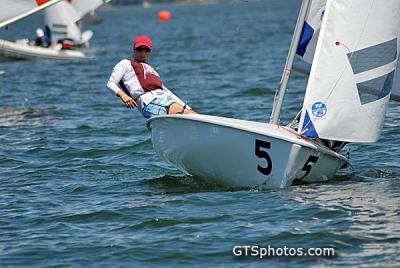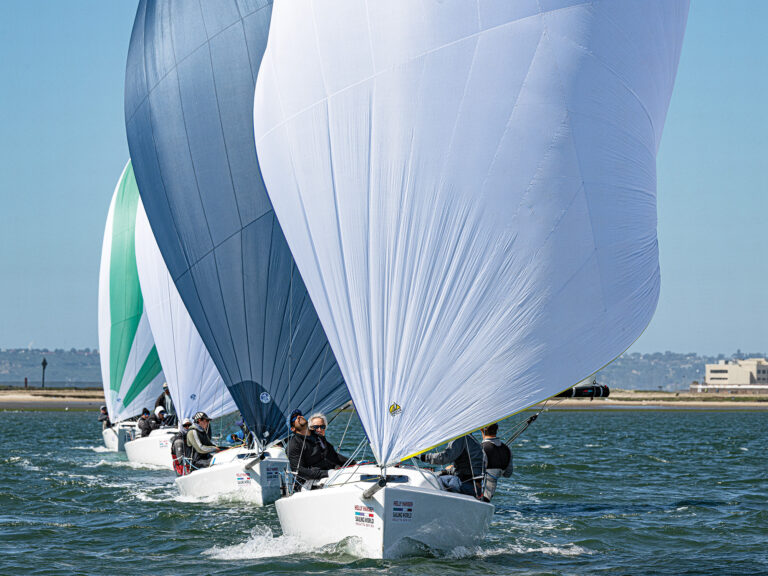
Waiting to Win
Long postponements in sweltering conditions at the ICSA Women’s Dinghy National Championship in Madison, Wis., weren’t enough to melt the determination of Allison Blecher (Fullerton, Calif.), the 2010 Quantum Female College Sailor of the Year. Blecher, a graduating senior from the College of Charleston Cougars, was rewarded for her efforts to stay in the shade and keep hydrated during a long wait period. She went on to win four of 10 races, securing the low score in A division and contributing to the Cougars’ overall win. Blecher’s win was the culmination of four years’ worth of work, as she learned how to sail her best by keeping cool on the water and maintaining an open mind in difficult situations.
What made this year so successful?
We put everything together. It [Nationals] was one of those events where everything clicked. We already were happy with how we had done all season so to put a big end to it was definitely fun.
How was Nationals different from other regattas this season?
It was a different venue, that’s for sure. A lot of places that we have sailed have had current; it was a change for us Charleston kids. But all in all, it was an awesome event. Wisconsin pulled it off.
How did you stay mentally prepared to race at Nationals with the long waiting periods?
We played a lot of cornhole [a lawn game involving tossing beanbags]. We got ice cream. Those of us who drank coffee were well hydrated off of it. We stayed out of the sun. A lot of teams were just sitting in the sun, losing a lot of energy, so we did a lot of in-the-shade sports.
How did you mentally check back into racing?
We tried to keep our minds off of racing for a little bit, and then, anytime we saw breeze, we’d work on getting back into it. Especially in Wisconsin, where every five minutes you would see a puff, but it would only last 30 seconds. We would try and get back into it, keep focus, then zone off for a little bit, then come back into it and zone off. We figured out a little pattern to keep in tune to what was going on.
What was your routine when you expected to go racing?
A lot of it was just staying hydrated, which kept us focused. The Charleston team loves candy, so that constant sugar high was nice. If you feel kind of foggy, you have a bottle of water, a little snack or something to get that energy level back up. It was good to have that available, unlike other teams who were forced to eat fruit and vegetables.
What was your routine when you finally got on the water?
Alyssa [Aitken] and I would set up the boat . Once the sequence had started, we would do three nice tacks in a row to get back in the boat. The three back-to-back tacks got us back into the game and into the mindset. We would also look around to see what was going on.
Looking back on four years of college sailing, what motivated you to succeed at this event this year?
Four years seems like forever. Things that I’ve learned throughout college sailing have really helped . . . It was just little things that all kind of built up. Going into Nationals, I think we, as a team, kept our heads in the game, not getting our egos too high or really down on ourselves. Starting our freshmen year, Shannon [Heausler] and I both learned, even just off the water, how to control ourselves—mentally and physically. I think that played a pretty big part.
What do you mean by “control”?
A lot of it was learning to not get caught up in tough situations on the water. When our minds are somewhere else, we’re not sailing as fast as we should be. We also learned to not get as tired as fast. We found that a lot of regattas we’d be on the water all day, and by the end of the day, there was no way we could still hike, trim and function. So we progressively got better throughout the year. Definitely by the end of it, we still had a lot to give. It was good to know we could still keep at it.
How did that improvement happen?
It had a lot to do with us working on it ourselves when we traveled. We also focused on the idea of controlling our mentality during race day practices. Alice [Manard] helped us with that by putting us in frustrating situations during practice so we could work on our self-control. We worked on it within our boats as well as between boats. We found that it was really important to keep an open mind throughout each race because everything seemed to work its way out if we kept working at it, catching every boat we could. As a team, we found that with the long days at nationals, we were able to stay in it the whole time and not get tired.** **
Sounds like you had a really good team dynamic.
Oh yeah. Two of us live together so we understand each other a little bit. My crew is amazing; Alyssa played a huge part in this whole thing.
How was your dynamic in the boat with Alyssa?
We struggled a little bit at the beginning to figure out how we both thought about what went on the racecourse. We realized that we both think very similarly, which was nice. We were on the same page. She’s an amazing crew, and whether she likes it or not, she’s a very good skipper. She did everything. I don’t think I sailed that boat. She and I get along both on and off the water, which is nice. It makes for a better team in general.
**Did you have any expectations about the Quantum Female College Sailor of the Year Award? **
No . . . it was something that was in the back of my mind and something that I had wanted to get. I was never really working for it per se, but it kind of kept me going. There’s plenty of competition out there; there are a lot of girls that could have gotten it, and I think all of us pushing each other towards the end made us all better sailors as well.
What kind of advice would you give to other sailors after winning this award?
You know what you want, and you know what your abilities are. Go out and make the best of everything.
What will you take away from your college sailing experience?
I learned a lot about myself both on and off the water throughout college. Our coaches really helped with that. [In terms of] figuring out what I want to do later on in life, I know I’m not going to sit behind a desk for too long. Hopefully, I’ll see a lot of the people that I’ve met in college more often now that I’m out of school. Trying to keep my fingers crossed for that one.
What are your plans now?
I’m going to do a little bit of coaching this summer [at California YC] and a couple of clinics. After that, maybe step into an Olympic class, not for 2012 but for 2016… maybe. Haven’t really thought about that part too much. But maybe do some more coaching before the real world. I’m going to postpone the real world as long as possible. I’m just unwinding from college, so we’ll see where it goes.
What have you been doing after nationals?
Not a whole lot. Taking some time off… I slept pretty well after nationals.









